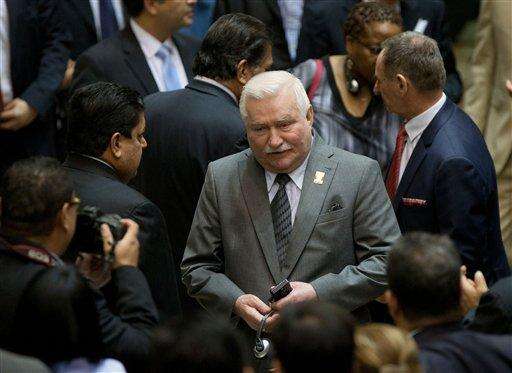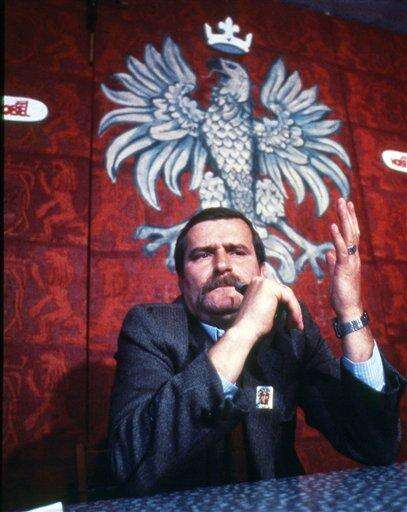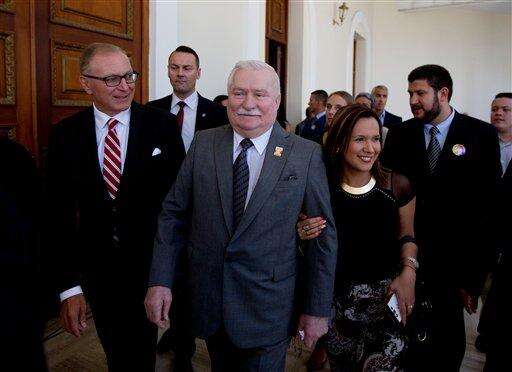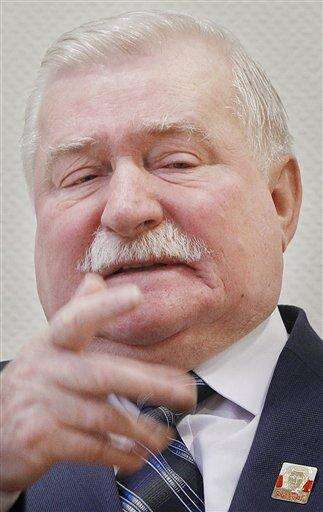Poland's former president and Solidarity founder Lech Walesa delivers a speech during a special session of Venezuela's National Assembly, in Caracas, Venezuela, Thursday, Feb. 18, 2016. Walesa, the icon of Poland's successful struggle to topple communism and the 1983 Nobel Peace Prize laureate, has previously acknowledged signing a commitment to be an informant, but has insisted he never acted on it. In 2000 he was cleared by a special court, which said it found no evidence of collaboration. (AP Photo/Fernando Llano)
The Associated Press
WARSAW, Poland (AP) - Lech Walesa, Poland's legendary anti-communist leader and former president, on Friday denied renewed allegations that he informed on people to the communist regime or took money from the secret security service.
Walesa was reacting to claims by a state history institute that recently seized documents include a commitment to provide information signed with Walesa's name and codename, "Bolek," and reports and receipts for money, dating from 1970-76.
"I was never broken (collaborating) in December 1970. I did not collaborate with the (secret security). I never took money and never made any spoken or written report on anyone," Walesa wrote on a blog. "I trust that truth will defend itself."
Head of the National Remembrance Institute, Lukasz Kaminski, has said the documents look authentic but historians still need to check whether what they contain is true.
Walesa said on the blog that during the many raids on his home and work places, the secret police seized his handwritten notes, also from a 1970 worker protest, that can now be "used as information on people."
In 1970, Walesa was a worker protest leader at the Gdansk shipyard but in 1976 was fired from his job. In 1980 he joined and led another protest at the shipyard that grew into Poland's nationwide Solidarity freedom movement that eventually ousted the communists.
He is globally-recognized icon of Poland's successful and peaceful struggle against communism and its transition to democracy. He won the 1983 Nobel Peace Prize for his role in ending communism in Poland and across Eastern Europe.
Observers note that the documents, for decades held at the home of the last communist interior minister, are being revealed now as Poland has a new right-wing ruling party that has voiced allegations against Walesa. The party leaders also maintain it was a corrupt deal that Solidarity struck with the communist authorities in 1989 that paved the way for democracy.
The institute's rush to reveal the documents on Walesa without checking their reliability has also raised questions.
FILE - In this June 16, 1983 file photo former Solidarity leader Lech Walesa makes the V-sign and raises his arms to a cheering crowd as he leaves the shipyard in Gdansk where he worked. The head of Poland's National Remembrance Institute said Thursday Feb. 18, 2016 that recently seized documents show that Walesa was a paid informant for the communist-era secret security from 1970 to 1976. (AP Photo/Jacques Langevin)
The Associated Press

Poland's former president and Solidarity founder Lech Walesa, center, is greeeted by lawmakers upon his arrival to deliver a speech during a special session of Venezuela's National Assembly, in Caracas, Venezuela, Thursday, Feb. 18, 2016. Walesa, the legendary anti-communist leader who played a historic role in bringing down communism in Poland, had served as a paid informant in the 1970s for the same communist regime that he later fought, according to documents revealed publicly. Walesa has previously acknowledged signing a commitment to be an informant, but has insisted he never acted on it. In 2000 he was cleared by a special court, which said it found no evidence of collaboration. (AP Photo/Fernando Llano)
The Associated Press

FILE - The 1983 file photo shows Lech Walesa, former leader of Poland's Solidarity movement during a press conference in Gdansk, Poland, after the Nobel committee announced that he is to receive the Nobel Prize for peace. The head of Poland's National Remembrance Institute said Thursday Feb. 18, 2016 that recently seized documents show that Walesa was a paid informant for the communist-era secret security from 1970 to 1976. (AP Photo/Czarek Sokolowski, file)
The Associated Press
FILE - In this Oct. 22, 2013 file photo Nobel Peace Prize laureate and Polandâs former President, Lech Walesa, looks at the audience during the annual meeting of laureates in Warsaw. The head of Poland's National Remembrance Institute said Thursday Feb. 18, 2016 that recently seized documents show that Walesa was a paid informant for the communist-era secret security from 1970 to 1976. (AP Photo/Alik Keplicz, file)
The Associated Press
FILE - The 1981 file photo shows Lech Walesa, leader of the forbidden Polish 'Solidarity Movement' in Poland. The head of Poland's National Remembrance Institute said Thursday Feb. 18, 2016 that recently seized documents show that Walesa was a paid informant for the communist-era secret security from 1970 to 1976. (AP Photo)
The Associated Press

A woman poses for a photo next to Poland's former president and Solidarity founder Lech Walesa, center, prior a news conference at Venezuela's National Assembly building, in Caracas, Venezuela, Thursday, Feb. 18, 2016. Walesa, the legendary anti-communist leader who played a historic role in bringing down communism in Poland, had served as a paid informant in the 1970s for the same communist regime that he later fought, according to documents revealed publicly. Walesa has previously acknowledged signing a commitment to be an informant, but has insisted he never acted on it. In 2000 he was cleared by a special court, which said it found no evidence of collaboration. (AP Photo/Fernando Llano)
The Associated Press

FILE - In this Feb. 19, 2015 file photo Poland's former president and Solidarity leader Lech Walesa talks with The Associated Press in Warsaw, Poland. The head of Poland's National Remembrance Institute said Thursday Feb. 18, 2016 that recently seized documents show that Walesa was a paid informant for the communist-era secret security from 1970 to 1976. (AP Photo/Czarek Sokolowski, file)
The Associated Press
FILE - In this April 30, 2009 file photo former Polish President Lech Walesa speaks in front of the Congress Hall hosting the European people's Party congress in Warsaw, Poland. The head of Poland's National Remembrance Institute said Thursday, Feb. 18, 2016 that recently seized documents show that Walesa was a paid informant for the communist-era secret security from 1970 to 1976. (AP Photo/Czarek Sokolowski, file)
The Associated Press